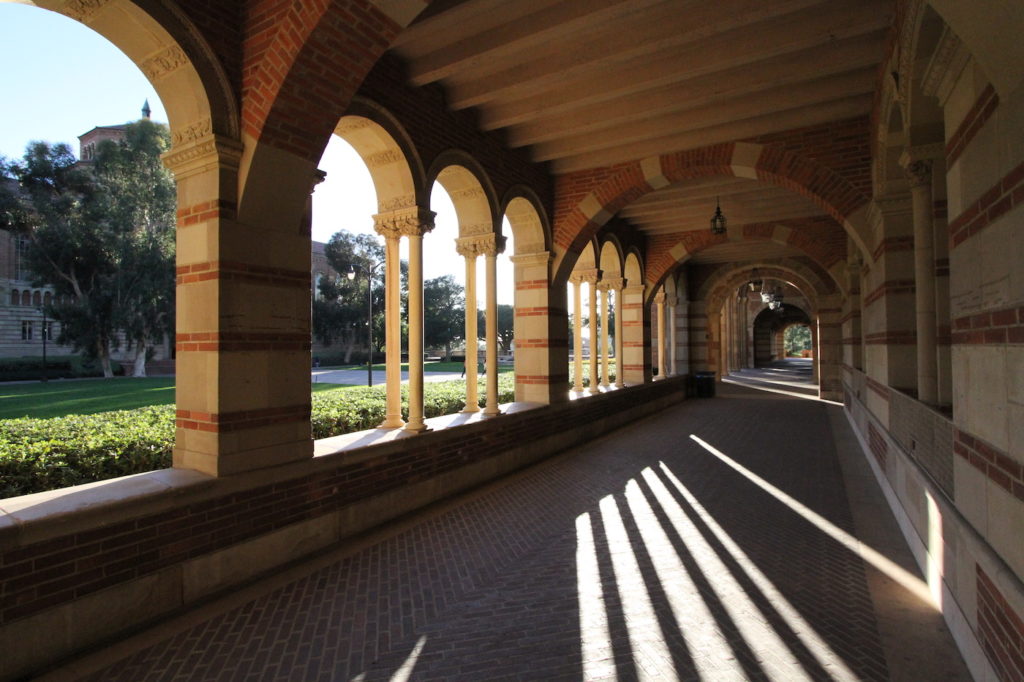Writing here at Public Discourse, Nathanael Blake takes issue with Robert George’s defense of traditional principles of academic freedom, under which a professor cannot be fired based on the ideas he or she advocates, even if those ideas are morally reprehensible. Characterizing that understanding as “the official moral relativism of absolute academic freedom,” Blake argues that, on the contrary, “universities should not hire professors who support” certain very bad ideas or practices, such as “infanticide, racism, or bestiality.”
Blake bases his argument on Alasdair MacIntyre’s claim that “certain conditions must be met if people are to inquire about the good together. They must . . . be able to trust the other members of the community to be honest” and “not inflict harm on them by theft, assault, and so on.” Hence, people advocating infanticide, racism, or bestiality cannot be part of such a community. Nor can “an ordinary Marxist academic” who “would ban our ideas, confiscate our property,” and “consign us to prison, torture, and execution.”
While MacIntyre makes an important point, Blake has vastly over-interpreted it. Academic freedom pertains to what professors say, but MacIntyre’s argument about “the perquisites for a community of moral instruction and inquiry” concerns what professors do. Although the argument shows that there must be some limits on what professors do, the argument proves nothing about imposing limits on what professors say.
The Norms of the Academic Community
Start your day with Public Discourse
Sign up and get our daily essays sent straight to your inbox.MacIntyre is right that you cannot maintain a community of any kind if some of its members lie to others about the community’s business, steal the group’s joint property, or physically attack other members. Actions like those are so destructive of the ends of the community as to materially impede their attainment. The range of such actions, however, is quite limited. At the bridge club, for example, we cannot tolerate people who cheat at cards, but we can tolerate people who cheat on their taxes or even on their wives. An adulterous tax-evader may be a fine bridge partner. An analogous point holds for a community of scholars working together to expand human knowledge. There are certain norms related to the community that its members must uphold and violations the community cannot tolerate. Hence, every university prohibits its faculty from plagiarizing scholarly articles, falsifying experimental results, embezzling from the university’s accounts, and murdering the department chair. Doing such things will get you fired, even at Harvard.
Academic freedom pertains to what professors say, but MacIntyre’s argument about “the perquisites for a community of moral instruction and inquiry” concerns what professors do.
But since the forms of wrongdoing destructive of the community’s shared ends are limited, there will always be other forms of wrongdoing, very serious in themselves, that are not threats to the community’s shared life. To take one of Blake’s own examples, bestiality is wrong on more levels than I care to contemplate, but if a professor in the mathematics department indulges in such things in his off hours, it really doesn’t stop him from teaching calculus effectively to undergraduates or participating in seminars with his colleagues on algebraic topology. If someone says that his students and colleagues could not respect him or take him seriously if it gets about what he does with sheep, then the answer is that the same would be true if it gets about what he does with his lawful wedded wife. We keep sex private (or we used to) in part for just such reasons.
This is not to say, of course, that a university need continue to employ a professor who engages in bestiality. Bestiality is a crime, and a university could certainly have a policy (as, in fact, many universities do) providing that if a faculty member is convicted of a crime, at least a serious one, his employment may be terminated. But the reason for such a policy is not the MacIntyrean argument that some norms must be enforced if the shared life of the community is to continue. The reason for the policy is the mundane one that a university that employs criminals as professors will suffer harm to its reputation. This is the same reason that many other organizations terminate employees who commit serious crimes.
Distinguishing Actions from Speech
If a university can flourish as a community of scholars even though some of its members are actively engaged in morally reprehensible actions unrelated to the shared life of the community, then surely it can flourish when some of its members merely speak or write in support of morally reprehensible ideas. Blake mentions Princeton’s Peter Singer, whose philosophical arguments would license certain forms of infanticide, which is as morally odious a practice as one can imagine. Nevertheless, no member of the Princeton faculty worries that Singer goes about at night actually murdering children. Even with Singer on faculty, Princeton remains a middling-good college. Indeed, I bet Blake himself would take a tenured position there if he were offered one.
Similarly, Blake says that “we cannot trust a Marxist professor to be truthful with us, nor be confident that he will refrain from harming us,” but the short answer is that we certainly can do these things, and we generally do. I have colleague who is an honest-to-Lenin, self-proclaimed Marxist, but I never worry that this man is going to pick my pocket, either literally or figuratively, and I certainly don’t worry he will arrest me and send me to the Gulag. I find his ideas odious (a compliment he returns in kind), but in person, he’s a decent sort of fellow. Having Marxists on faculty does not make running a university impossible.
More generally, I have faculty colleagues with whom I vehemently disagree on any number of moral questions, and in a few cases, I think their ideas on certain topics are profoundly morally wrong. Nevertheless, I count these same people as friends, and we often work together for the good of the university we serve. Blake seems to be falling into the fallacy of thinking that people with bad ideas must be bad people, a mistake I have written about before and which is best cured by wider experience.
Although he does not expressly say so, Blake seems to realize that tolerating professors with odious ideas does not actually prevent the community of scholars from flourishing, and so he has a fallback position, which is that the traditional notion of academic freedom still involves “contradictions” and so is “unsustainable” in the long run. The irony here appears lost on Blake. When most philosophers talk about “contradictions,” they mean a sentence that is false as a matter of logic, like “P and not-P.” The notion of “contradiction” that Blake is using, however, comes from the dialectical materialism of Karl Marx (think “the contradictions of capitalism”) and refers to a conflict of social forces within a community that cannot continue indefinitely but must at some point be resolved (e.g., the class conflict between workers and owners in a capitalist society that will eventually lead to the communist revolution). As to exactly which forces in academia Blake sees as being in conflict with which, I cannot quite make out, but little turns on this, for my reaction to all such Marxist-inspired arguments is the same: we are being asked to believe, on the basis of a philosophical argument about ideas, that certain future events will inevitably occur in reality, and that is just a category mistake. The truth is, the connection between ideas and events in the real world is not a tight one, and what will happen in reality cannot be deduced from philosophical theories.
Empowering university administrators to decide which speech is good and which is bad in this way is so dangerous that it is objectively wrong, just as giving teenage boys whiskey and automobiles is objectively wrong.
Academic Freedom Doesn’t Entail Moral Relativism
Still, Blake raises a good question when he asks why universities tolerate professors who support morally reprehensible ideas. Blake thinks the answer is “moral relativism,” but that cannot be right, for, as we saw above, universities have no trouble enforcing moral norms against plagiarism, embezzlement, and the rest. So why mention moral relativism? I suspect the answer is that, if the university held that all ideas were equally good and equally bad, then it would make little sense to punish a professor on the basis of his ideas, and so the university would have a strong policy of academic freedom. In other words, moral relativism implies academic freedom. But even conceding this point arguendo, it is just a logical fallacy (the fallacy of affirming the consequent) to infer the converse and conclude that academic freedom implies moral relativism.
The fallacy becomes obvious when we reflect that there are strong arguments for academic freedom based on objective moral theories. For example, although some academic speech is objectively good and other academic speech is objectively bad, nevertheless limiting academic freedom requires empowering university administrators to decide which speech is good and which is bad, which should be allowed and which suppressed. Empowering people in this way is so dangerous that it is objectively wrong, just as giving teenage boys whiskey and automobiles is objectively wrong. Even when university officials act in good faith, there will be many close calls, and history teems with examples of speech once widely considered bad that we now believe is good, and vice versa. Hence, in any system of speech regulation, the decisions of those running the system will involve a very high error rate, and, even worse, the errors will not be randomly distributed but will skew strongly in favor of ideas with which the officials themselves agree and against ideas with which they disagree.
The fact that there are some easy cases (bestiality is wrong) does not change this; once officials are empowered to decide which speech will be allowed and which suppressed, they will decide not only the easy cases but the hard cases as well. Moreover, the people running the system will not always act in good faith but will sometimes abuse their power to punish those with whose speech they disagree. Indeed, the history of censorship strongly suggests that such abuses are common. On this view, although free speech and academic freedom come at a cost (bad speech is permitted and causes real harm), the costs of a system of censorship are much worse.
This Has to Stop
I have made these points over and over and over and over and over and over again, most recently and elaborately in a debate here at Public Discourse with my good friend Hadley Arkes. Frankly, I am getting tired of repeating myself. Anyone is free to disagree with arguments like those above, to say that although a system of censorship or curtailed academic freedom would make errors and be subject to abuse, nevertheless we would be better off overall if we had such a system, because it would suppress enough really bad speech to make the benefits outweigh the costs. That seems entirely implausible to me, but someone arguing in good faith could surely come to such a conclusion. That’s where Arkes comes out, and I respect that position as I continue to disagree with it.
What is not within the realm of good faith argumentation, however, is to just ignore well-known arguments like those given above and insist that we who believe in free speech and academic freedom are moral relativists. Since we have disclaimed relativism and given plausible, non-relativist reasons for our position, it is just shoddy scholarship, or else intellectual dishonesty, to keep calling us relativists.
It takes a lot to provoke me to write an essay defending the rights of professors who advocate, as Blake puts it, killing babies and molesting sheep. Still, I am writing because arguments like Blake’s attacking the foundational principles of a free society, principles like free speech and academic freedom, have to stop. They have to stop because they are shoddy arguments that flagrantly ignore well-known counterarguments. They have to stop because they are clearly not well thought out and invite obvious objections of which their authors seem unaware. They have to stop because, for all the world, they give the impression of being motivated by a deep insecurity: because conservative ideas have not triumphed in the public square, we need to resort to means other than argument and persuasion to promote those ideas.
They also have to stop because they are so weirdly irrelevant. The United States of America is a tremendous and boisterous country in which people from all over the world meet, each of us bringing different ideas and experiences to a raucous public conversation. The relevant question is thus what kinds of laws and policies are good for a people like us in a society like ours. Answers to that question that involve using force to suppress speech merely because of its viewpoint are just non-starters. No matter how well they play in small conservative echo chambers, they haven’t the slightest chance of being adopted in practice. In a country like ours, anyone who comes into the public square has to accept from the outset that there will be many people who disagree with him on even the most basic moral issues. If someone gets hung up on that and starts wondering how to suppress the speech of those who disagree with him, he merely takes himself out of the public conversation. The point for any person of goodwill is to join that conversation and, as far as he can, try to move things in the right direction. More than that he cannot do, and beyond that he need only trust in the providence of God that all will come right in the end.














